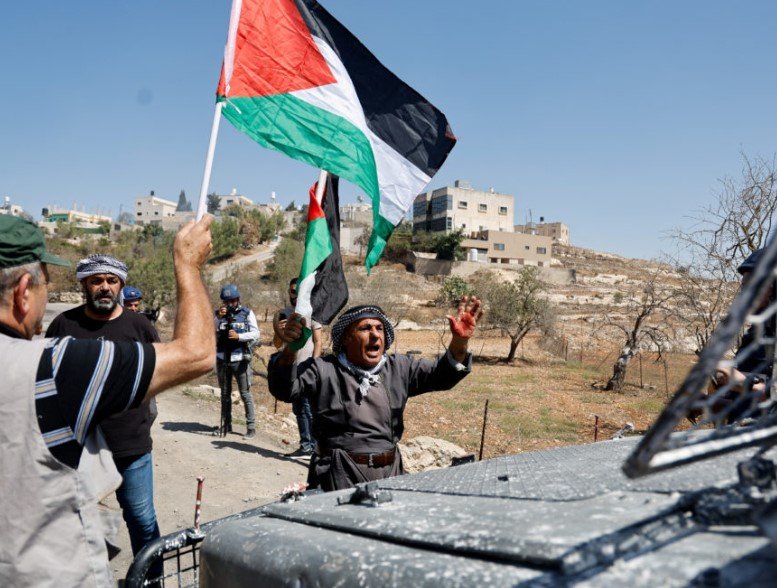The Foreign Press Association has called on Israel to stop settler attacks on journalists after a violent incident near the West Bank village of Beita. This happened last week when Reuters staff were assaulted while covering the Palestinian olive harvest, highlighting growing dangers for media workers in the area.
Details of the Beita Attack
Witnesses described a group of masked Israeli settlers armed with sticks and rocks targeting journalists and villagers. The assault took place on November 8, 2025, as people gathered to harvest olives near a settler outpost.
One Reuters journalist, Raneen Sawafta, suffered injuries after being beaten while wearing a clear press vest. Her security adviser was also hurt in the chaos. Reports indicate the attackers focused on areas not protected by safety gear.

Medical teams rushed the injured to hospitals, where they received treatment for bruises and cuts. This event adds to a pattern of violence during the olive season, which is crucial for Palestinian families.
Foreign Press Association’s Response
The Foreign Press Association, representing international media, expressed shock over the attacks. They urged Israeli authorities to act fast and protect journalists.
In their statement on November 10, 2025, the group pointed out that reporters have become direct targets while documenting settler actions. They called for investigations and measures to prevent future incidents.
This demand comes amid broader criticism from media watchdogs. Groups like the Committee to Protect Journalists have tracked similar cases, noting a rise in threats to press freedom in the region.
The association highlighted how such violence hinders accurate reporting on West Bank issues.
| Key Incidents in Recent Attacks | Date | Location | Victims |
|---|---|---|---|
| Reuters staff assault | November 8, 2025 | Near Beita | Journalists and villagers |
| Previous olive harvest clash | October 2025 | Masafer Yatta | Palestinian farmers |
| Journalist beating in Bethlehem | October 2023 | Nahhalin | Local reporters |
Background on Olive Harvest Violence
The olive harvest season often sparks tensions in the West Bank. Palestinians rely on these groves for income, but settlers sometimes disrupt the work, claiming land disputes.
In 2025, reports show over 30 similar attacks, up from previous years. Human rights groups say Israeli forces often fail to intervene, allowing settlers to act without fear.
This year’s violence has injured dozens, including activists and farmers. International observers note that olive trees, symbols of Palestinian heritage, are frequent targets for uprooting or burning.
Experts link the rise to political shifts, with some settler groups feeling bolder under current policies.
Logical reasoning suggests that without stronger enforcement, these clashes could escalate, affecting peace efforts in the region.
Impact on Journalists and Media Freedom
Journalists face increasing risks in conflict zones like the West Bank. The Beita incident injured at least 10 media workers, according to eyewitness accounts.
Such attacks not only harm individuals but also limit global awareness of local events. Reporters from outlets like Al Jazeera and Reuters have shared stories of being chased or beaten.
- Common threats include physical assaults with weapons.
- Intimidation tactics, such as vehicle damage.
- Restrictions on access to harvest sites.
These challenges make it harder to cover stories fairly. Media advocates argue that protecting journalists is key to upholding democratic values.
Broader Context and Related Events
Recent events tie into a surge of settler activity across the West Bank. In October 2025, similar attacks in places like Masafer Yatta left farmers hospitalized.
The United Nations has condemned these actions, calling for accountability. Data from 2025 shows over 500 incidents of settler violence, a record high.
This fits into ongoing debates about land rights and security. Peace talks remain stalled, with olive harvest disruptions adding fuel to the fire.
Analysts predict more tension as the season continues into December.
Calls for International Action
World leaders have started responding to the violence. The European Union issued a statement urging Israel to safeguard civilians and media.
Human rights organizations push for sanctions on violent settlers. They argue that global pressure could lead to change.
In the United States, some lawmakers have raised concerns, linking it to foreign aid discussions.
As this story develops, staying informed helps support press freedom and peace initiatives.
Share your thoughts in the comments below or spread the word on social media to raise awareness about these critical issues.
